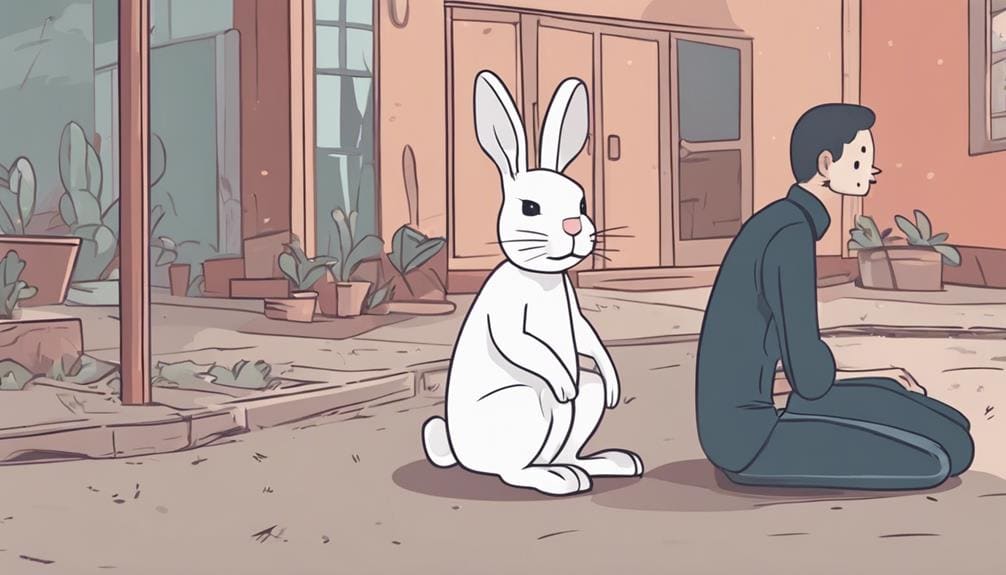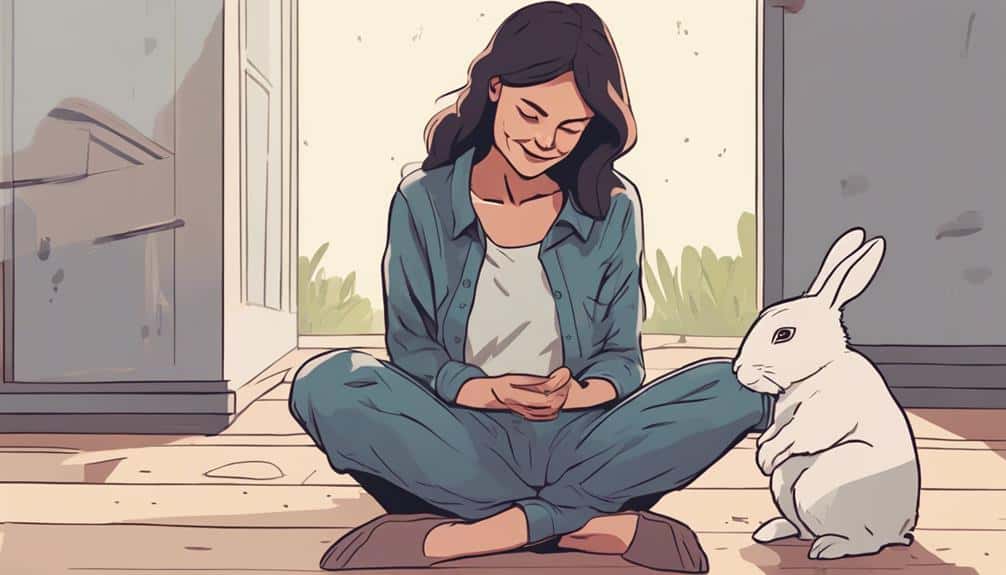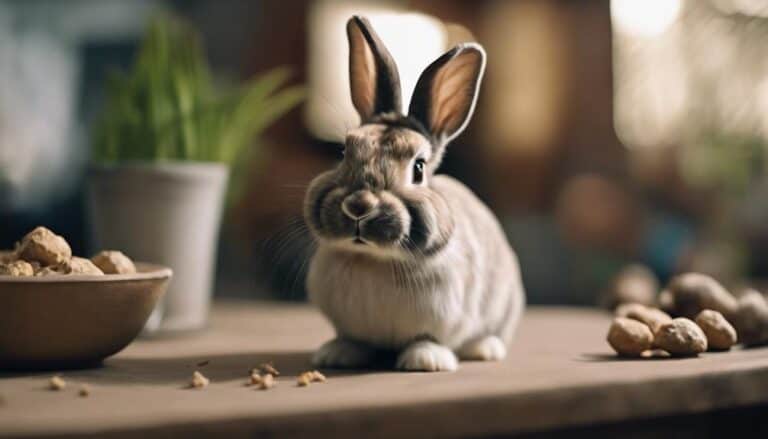Have you ever wondered if your fluffy bunny companion can truly comprehend the range of emotions you experience daily? While their cute twitching noses and gentle hops may seem purely instinctual, there might be more to these adorable creatures than meets the eye.
As you observe the interactions between bunnies and their human counterparts, you might start to uncover intriguing insights into the depths of emotional understanding between these furry companions and their owners.
Contents
- 1 Key Takeaways
- 2 Can Bunnies Read Human Emotions?
- 3 Understanding Bunny Body Language
- 4 Bunnies' Empathy Towards Humans
- 5 Signs of Emotional Connection With Bunnies
- 6 Expressing Emotions to Your Bunny
- 7 Reading Emotions in Bunny Behavior
- 8 Communicating Emotions to Bunnies
- 9 Strengthening Bonds Through Emotional Understanding
- 10 Frequently Asked Questions
- 11 Can a Bunny’s Display of Affection Reflect Understanding of Human Emotions?
- 12 Conclusion
Key Takeaways
- Rabbits discern human emotions through body language and vocal cues.
- Studies suggest rabbits show empathy towards humans in distress.
- Emotional cues projected by owners impact rabbits' behavior and well-being.
- Establishing trust and consistency leads to a strong emotional connection.
Can Bunnies Read Human Emotions?

Rabbits can accurately discern human emotions through subtle cues in body language and vocal intonations. Studies indicate that these small creatures possess a remarkable ability to sense changes in their owners' emotional states. Research suggests that rabbits can differentiate between positive and negative emotions, demonstrating a form of empathy towards their human companions.
Not only can rabbits recognize emotions, but they also have the capacity to mirror these emotions, exhibiting similar responses. When their owners are stressed or upset, rabbits may show signs of distress or seek to comfort them, reflecting a deep level of emotional connection. This ability to mirror emotions highlights the sensitivity and awareness that rabbits have towards the feelings of those around them.
It's essential to be mindful of the emotional cues we project, as they can have a significant impact on a rabbit's behavior and overall well-being. By understanding and acknowledging the emotional capacity of rabbits, we can foster stronger bonds and create a harmonious environment for both humans and their furry companions.
Understanding Bunny Body Language
Understanding bunny body language plays a crucial role in accurately interpreting their emotions and responses. Rabbits communicate through various physical cues, such as ear positioning, body postures, and tail movements.
For instance, ears held upright and forward indicate curiosity or alertness, while a lowered head and flattened ears may signal fear or submission. Additionally, a raised and twitching tail can show excitement or agitation in bunny body language.
By recognizing and comprehending these signals, you can build a stronger emotional bond with your pet rabbit. This comprehension also helps in making changes in your behavior to guarantee a positive interaction with your bunny.
Being attuned to your rabbit's body language can lead to a deeper understanding of their feelings and needs, fostering a harmonious relationship between you and your furry companion.
Bunnies' Empathy Towards Humans

In studying bunnies' empathy towards humans, researchers have observed their ability to sense changes in human emotions through various cues. Rabbits can pick up on subtle shifts in your emotional state, responding to your body language, tone of voice, and behavior patterns.
Scientific studies suggest that rabbits are capable of showing empathy towards humans in distress. When they sense their owner's emotional state, rabbits may exhibit comforting behaviors like grooming or cuddling. These furry companions can differentiate between different human emotions such as fear, happiness, and anxiety.
Their sensitivity to your emotions can influence how they interact with you, adapting their behavior accordingly. Understanding and appreciating the empathetic nature of bunnies can deepen the bond between you and your pet, fostering a connection built on mutual understanding and care.
Signs of Emotional Connection With Bunnies
When observing the signs of emotional connection with bunnies, it becomes evident that these furry companions demonstrate a unique ability to mirror and respond to human emotions through various behaviors.
- Bunnies can sense changes: Rabbits feel and respond to shifts in human emotions through body language, tone of voice, and behavior.
- Empathy and comfort: They may show empathy towards their owners by offering comfort or seeking reassurance in times of distress.
- Mirroring emotions: Some bunnies mirror their owner's emotions, displaying similar behaviors when feeling happy, sad, or stressed.
- Seeking closeness: Bunnies may seek physical closeness or offer affectionate gestures in response to their owner's emotional state.
- Trust and consistency: Establishing a strong emotional connection with bunnies involves consistent positive interactions and building trust over time.
Understanding these signs can help deepen the bond between you and your bunny, creating a mutually beneficial relationship. By being attentive to their responses and providing a nurturing environment, you can enhance the emotional connection with your beloved pet.
Expressing Emotions to Your Bunny

Expressing emotions to your bunny can significantly impact the strength of your bond with them. Rabbits are highly attuned to human emotions through subtle cues like tone of voice and body language. Rabbits can pick up on your facial expressions, so maintaining a calm and positive demeanor around them is important.
When interacting with your bunny, use a gentle tone of voice to convey affection and comfort. Additionally, rabbits have a keen sense of smell, so make sure you're in a calm state when around them to avoid transmitting any stress or anxiety. Avoid sudden movements or loud noises that may startle your bunny, as this can lead to a breakdown in communication.
Offering treats and engaging in gentle petting sessions can also help communicate your love and care for your bunny. By creating a peaceful environment and being mindful of your expressions and tone, you can foster a strong emotional connection with your bunny.
Reading Emotions in Bunny Behavior
Understanding Rabbit Behavior Cues Can Provide Insights into Human Emotions.
Rabbits have a unique ability to detect changes in human emotions through subtle cues. By observing your bunny's behavior closely, you can gain valuable insights into your own emotional state. Here are some key points to bear in mind:
- Mirror Emotions: Rabbits may mirror their owner's emotions, reacting with signs of distress or comfort based on your mood.
- Varied Responses: Different emotional states in humans, such as fear, happiness, or stress, can elicit varied responses from rabbits.
- Sense Changes: Studies suggest that rabbits are on high alert and can sense changes in their owner's emotional well-being.
- Make Sure: When interacting with your bunny, make sure to pay attention to their body language and vocalizations for clues about your emotional state.
- Stay on High Alert: Being on high alert for changes in your rabbit's behavior can help you understand how they perceive your emotions.
Communicating Emotions to Bunnies

You can communicate your emotions to bunnies through your body language and tone of voice. Rabbits are sensitive to changes in your emotional state and may mirror your feelings in response.
Creating a calm and soothing environment can help strengthen the bond and understanding between you and your bunny.
Bunny Body Language
When communicating emotions to bunnies, paying attention to their body language is essential for establishing a strong connection and understanding their responses. Bunnies can interpret human emotions through cues like posture, facial expressions, and gestures. They respond to changes in tone of voice and vocal cues, adjusting their behavior accordingly.
Understanding and mirroring human emotions helps bunnies bond with their owners and feel secure. Consistent positive interactions and a calm environment contribute to bunnies comprehending and responding to human emotions effectively. By being observant of their body language and providing a nurturing environment, you can enhance communication and strengthen your bond with your bunny.
Tone of Voice
Rabbits exhibit sensitivity to human emotions by discerning changes in tone of voice, reflecting their capacity to interpret varying emotional cues. When communicating with your bunny, remember that they can sense your emotions through the way you speak.
Rabbits may offer unconditional love, but they also learn to trust based on how you interact with them. Using a soothing and gentle tone can positively influence their behavior and comfort levels. Studies show that rabbits react differently to various tones of voice, indicating an understanding of emotional cues.
Consistency in your tone can help strengthen the bond between you and your bunny, creating a more harmonious relationship built on trust and understanding.
Strengthening Bonds Through Emotional Understanding
Rabbits' ability to recognize non-verbal cues tied to human emotions, coupled with their display of empathy, can foster a mutual emotional connection between owners and their furry companions. This emotional understanding allows rabbits to respond with affection or concern to the varying emotional states of their owners, ultimately strengthening the bond shared between them.
Non-Verbal Cues Importance
Understanding the importance of non-verbal cues is key to enhancing the emotional bond between rabbits and their owners. Rabbits, as prey animals, are sensitive to subtle changes in human behavior, which can greatly impact their emotional well-being. By paying attention to non-verbal cues, you can strengthen your relationship with your rabbit in the following ways:
- Enhanced Communication: Non-verbal cues help convey emotions effectively.
- Increased Empathy: Understanding your rabbit's responses to your cues fosters empathy.
- Mutual Understanding: Non-verbal communication builds a foundation of trust and understanding.
- Supportive Environment: Responding to your rabbit's cues creates a safe and comforting space.
- Consistent Interactions: Regular positive interactions reinforce the emotional connection.
Empathy in Action
Paying attention to non-verbal cues between humans and rabbits reveals a deeper layer of emotional connection and understanding, particularly in how empathy translates into action. Rabbits exhibit empathy by responding to their owner's emotions, showcasing a level of emotional understanding in the human-animal relationship.
When owners display certain emotional cues, rabbits can mirror these feelings, indicating a shared emotional bond. This ability to empathize allows rabbits to provide comfort and support based on their sensitivity to human emotions.
Mutual Emotional Connection
Strengthening emotional bonds between humans and rabbits is facilitated through a mutual understanding of emotions, enhancing the relationship dynamics and fostering companionship. Rabbits can mirror their owner's emotions, showing empathy and strengthening the emotional bond. They respond to changes in their owner's emotional state, indicating a level of understanding.
Additionally, rabbits may exhibit protective behaviors towards owners in distress, further exemplifying the emotional connection between them. This mutual emotional understanding not only leads to increased trust and communication but also positively impacts the well-being and happiness of both rabbits and their owners. Through these behaviors, the bond between humans and rabbits is deepened, creating a fulfilling and supportive relationship.
Frequently Asked Questions
Can My Rabbit Feel My Emotions?
Your rabbit can feel your emotions through nonverbal cues and emotional mirroring. By bonding through emotions, they show empathy and sensitivity, creating a strong human connection. This indicates that your rabbit is attuned to your feelings.
Do Rabbits Have Feelings for Their Owners?
Rabbits establish strong feelings for their owners through bonding behavior, recognizing nonverbal cues, and fostering unique relationship dynamics. Their emotional connection is based on trust, care, and mutual understanding, creating a special bond.
Do Rabbits Understand What We Say to Them?
When you speak to rabbits, they may understand your tone and patterns, but not the actual words. Through nonverbal cues like body language and vocal inflections, they respond to your emotions. Communication relies on subtleties.
Are Rabbits Emotionally Intelligent?
Rabbits exhibit emotional intelligence through recognizing social cues and displaying empathy. They bond with humans through nonverbal communication, understanding body language. This connection enhances the relationship, as rabbits distinguish between positive and negative emotions, fostering mutual understanding.
Can a Bunny’s Display of Affection Reflect Understanding of Human Emotions?
Some believe that bunnies kissing to show love displays their understanding of human emotions. Bunnies are known for their affectionate behavior, and their display of love through kisses reflects a deep connection and understanding of human emotions. This adorable behavior is a clear sign of their emotional intelligence.
Conclusion
To wrap up, while rabbits may seem to understand your emotions, remember that they're still animals with their own unique perspectives. So next time you think your bunny is comforting you, just remember they might be more interested in their next treat than your feelings.
Keep enjoying their company, but don't read too much into their empathy – they're just bunnies after all.






